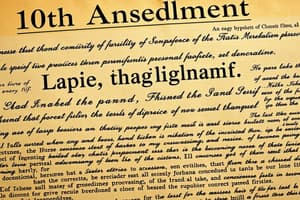Podcast
Questions and Answers
What does the 10th amendment state regarding powers not in the Constitution?
What does the 10th amendment state regarding powers not in the Constitution?
If a power is not in the Constitution, the power goes to the states.
Slavery is included in the Constitution.
Slavery is included in the Constitution.
False (B)
Who has the power to make decisions about slavery according to the content?
Who has the power to make decisions about slavery according to the content?
The states have the power to make decisions about slavery.
What does nullification mean?
What does nullification mean?
The South was forced to buy goods from Europe due to the tariff.
The South was forced to buy goods from Europe due to the tariff.
What was the primary reason for the South's refusal to pay the tariff?
What was the primary reason for the South's refusal to pay the tariff?
The cost of cloth in the United States was ______ a roll.
The cost of cloth in the United States was ______ a roll.
Flashcards are hidden until you start studying
Study Notes
States' Rights
- The 10th Amendment of the United States Constitution, part of the Bill of Rights, establishes that any powers not specifically delegated to the federal government are reserved to the states, or to the people.
- The Constitution does not mention slavery explicitly.
- This lack of constitutional mention led to the belief that states had the inherent power to determine their own policies regarding slavery.
Nullification Crisis
- The Nullification Crisis arose from a dispute over tariffs, or taxes, imposed by the federal government on imported goods.
- The South felt that the tariffs forced them to buy more expensive goods from Northern factories rather than cheaper goods from Europe.
- The South argued that states had the right to nullify, or declare invalid, federal laws they deemed unconstitutional.
- This was known as the "nullification doctrine."
- The South's refusal to pay the tariff led to heightened tensions between the North and South.
- This crisis ultimately highlighted the growing sectional differences between the two regions.
- The crisis further fuelled the debate over states' rights and federal power.
Studying That Suits You
Use AI to generate personalized quizzes and flashcards to suit your learning preferences.




